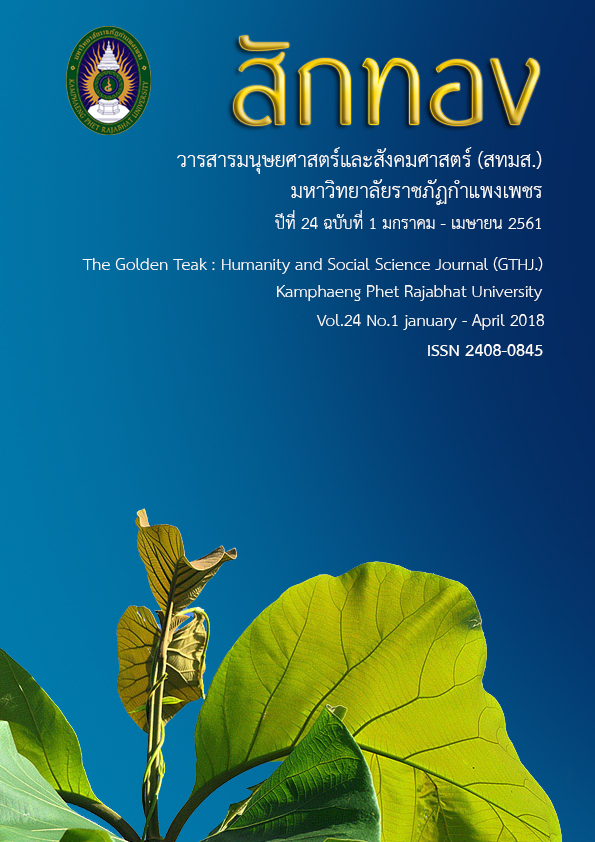Learning by the Experience Appending Activity in Science Skill “Learn Science by Practice” of Science content for grade 4-6’s students, Ban Kaonumphet School, Amphur Muang, Kamphaeng Phet Province
Main Article Content
Abstract
This research has the aim as 1. to develop the experience appending activity in science skill by using “learn science by practice” which was efficiency 80/80 2. to study the output and outcome of the experience appending activity in science skill by using “learn science by practice” of grade 4-6’s students by using “learn science by practice” at Ban Kaonamphet School, Amphur Muang, Kamphaeng Phet Province. The sampling were 37 students in 2011. The results found that the science learning efficiency by using “learn science by practice” for each of grade 4-6’s students were higher score than 80/80 standard score and the output and outcome of the experience appending activity in science skill by using “learn science by practice” were 1) the achievement of the education was pre-test score higher than post-test score which was significant different at the 0.01 level, the students had 2) high to highest level in 13th science skill developing and 5 from 8 science attitudes, 3) high level in 5 desirable characteristics and 8 learner’s capacities, and developed their skill in 21st century completed for 3 R and nearly completed for 7 C : excepted the Cross-cultural understanding skill.
Article Details
บทความที่ได้รับการตีพิมพ์เป็นลิขสิทธิ์ของวารสาร สักทอง : วารสารมนุษยศาสตร์และสังคมศาสตร์ สถาบันวิจัยและพัฒนา มหาวิทยาลับราชภัฏกำแพงเพชร
ข้อคิดเห็นใดๆ ที่ปรากฎในวารสารเป็นวรรณกรรมของผู้เขียนโดยเฉพาะ ซึ่งมหาวิทยาลัยราชภัฏกำแพงเพชรและบรรณาธิการไม่จำเป็นต้องเห็นด้วย
References
Anantanasagun, D. (2004). The Development of Procedural Skill and Attitude in Scientific Learning among Students in Lower Secondary Level Using the Scientific Learning Camp. Thesis of Master degree of Education, Khon Kaen University.
BMAMedia Service Center, Info Media Innovation, Bangkok Education. (2015). Active Learning. [Online]. Available :
http://www.bmamedia.in.th/index.php?option=com_content&task=view&id=500&Itemid=51. [2015, August 25].
Chumnankit, B. (2006). Do you need to learn to learn in higher education. Journal of Knowledge Management, 1(1), 1-7.
Comia, A. & Ryan, C. (2006). Creative movement : A powerful strategy to teach science. Retrieved November 27, 2006. [Online]. Available : http://openlibrary.org/b/OL21549770M/Creative_movement_A_powerful_strategy_to_teach_science. [2014, August 23].
Covtrakoon, S. (2005). Phycology. (6 th ed.). Bangkok : Chulalongkorn University Press.
Dechsri, P. (2002, January-Fbruary). Active Learning : How to do. Journal of Science Math and Technology Education, 30(1), 53-55.
Faculty Development Academy, Walailak University. (2012). Idea to define the Concept of Active Learning. [Online]. Available : http://active-learning.wu.ac.th/th/detail/10016. [2013, Fbruary 23].
Faculty of Education, Changmai University. (2011). How to get the Strategy of Learning method to be fun and Student has pleased. Seminar Report of Conceptual ‘s the Strategy of Learning method in class. September 28, 2011. Imperial Mae Ping Inn. Changmai : Changmai University.
Manopichetwatana, S. (2004). The Development of Intrigated Science Instruction Emphasizing Active Learning on the Human Body. Ph-Ed. Thesis in Science
education Srinakharinwirot University.
Office of Nation Education Standards and Quality Assessment. (2006). Self Assessment Report of Ban Kaonamphet School. Bangkok : Office of Nation Education Standards and Quality Assessment.
Poodeach, A. (1998). Active Learning. Journal of Private Education, 7(72), 57-58.
Ruangsuwan, C. (n.d.). Active Learning. [Online]. Available : http://www.drchaiyot.com [2009, June 25].
Sawanakunanont, Y. (2000). An Alternative Laboratory Approach Development for Teaching Science in Lower Secondary School. Research Report Songkhla :
Songkhla Rajabhat University.
Simpson, D. (1972). Teaching physical education : A system approach. Boston : Houghton Mufflin Co.
Siriratanajit, A. (2014). Low O-Net Solution’s Problem. [Online]. Available : http://www.manager.co.th/Daily/ViewNews.aspx?NewsID=9570000110496.
[2014, August 23].
Tantipalashewa, K. (2000). Psycho-Intellectual Model : Guide to get lesson plan for Kindergarten level. Bangkok : Adison Press producted.
Wonnasuth, W. (2007). The outcome of Learning activities Organized for the subject of “Ecology” in the Science learning substance for Students in Mathayomsuksa III, Using the Inquiry Cycle Model. Master of Education Independent Study in Curriculum and Instruction, Graduate School, Maha sarakram University.

